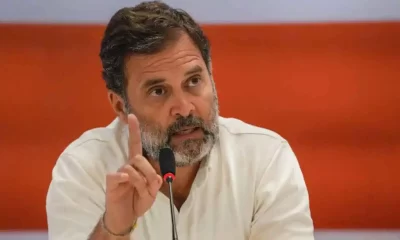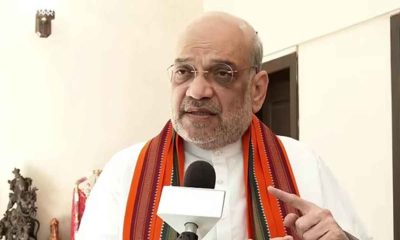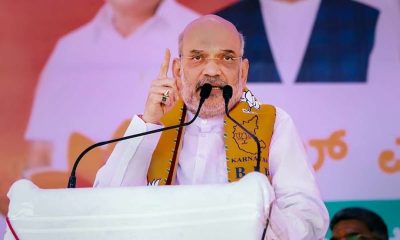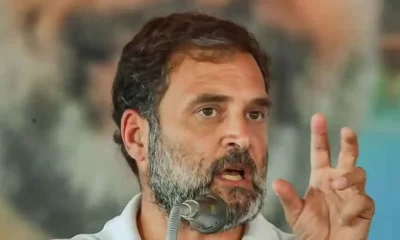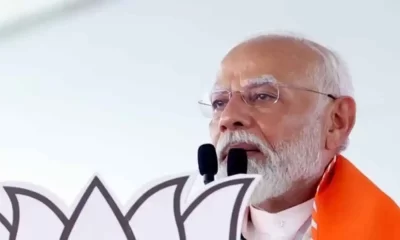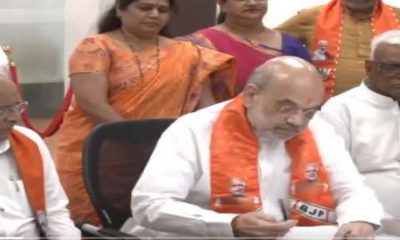Opinion & analysis
Selling pakodas as a form of employment is an idea showing simplicity of genius
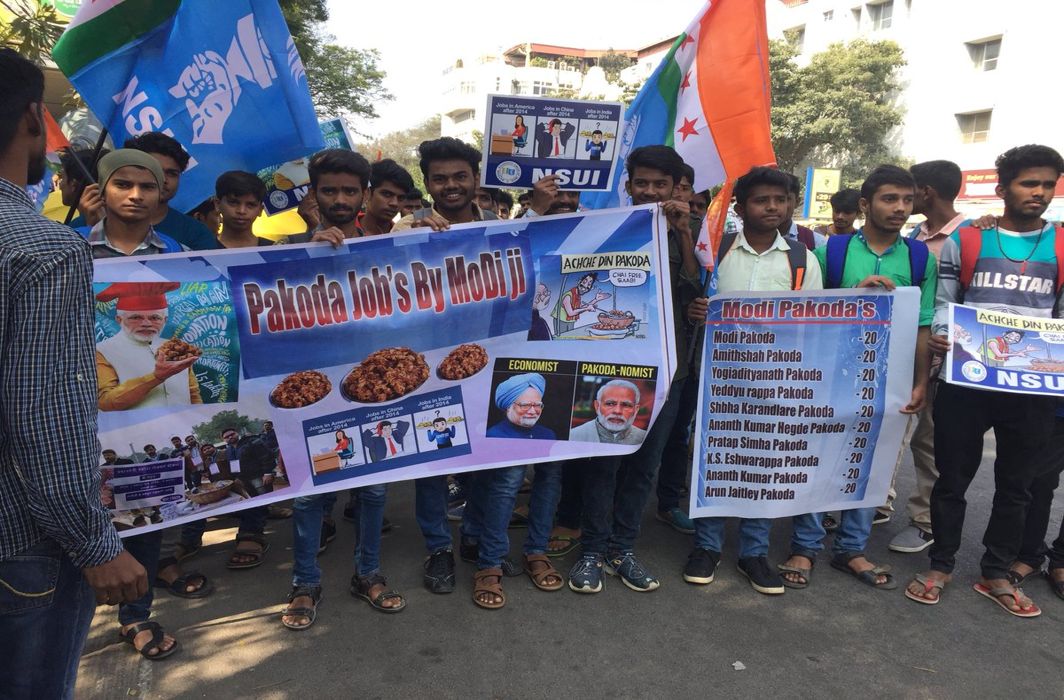
~By Rajesh Sinha
You can’t have your pakoda and eat it too. You cannot say it is a good thing but others cannot have it.
Prime Minister Narendra Modi had said in an interview to a news channel recently: “If someone opens a ‘pakoda’ shop in front of your office, does that not count as employment? The person’s daily earning of Rs200 will never come into any books or accounts. The truth is massive number of people are being employed.”
The statement created a stir. What a solution to the problem of unemployment that almost every expert, including – and especially – the Harvard and Oxford-educated economists had termed as intractable. It was the simplicity of genius. But it seems the country just isn’t fully ready for this revolutionary idea.
Congress leader Sanjay Nirupam was detained by police when he was on his way to sell pakodas outside Mantralaya – as if it was a crime. Even if it was – which it isn’t, ask the PM – the police acted even before it was committed. Something like police rounding up some men from some park/building claiming they were planning a dacoity.
Students selling pakodas near the venue for PM’s rally were arrested. In Uttar Pradesh, where Yogi Adityanath does not take kindly to anything ‘unpalatable’ to him, found the job of Samajwadi Party and Congress workers, and some students selling pakodas an offence serious enough to let the police thrash them for it.
Contrast this with Delhi BJP chief Manoj Tiwari’s plans to have pakoda parties in different parts of the city. The BJP or its leaders, including the PM, do not seem to have any problems with this. Nor, apparently, has Delhi Police, which reports to the Union Home Ministry.
What do Tiwari’s pakodas have that others don’t? Why this kind of pakoda discrimination? Was the guy selling pakodas outside Zee TV office, whom the PM mentioned as a shining example of employment opportunities provided by his government, also from BJP?
The government has to answer. The Nation wants to know. It was an avenue of employment hailed by the top honcho himself, and he surely did not mean to say it was intended only for BJP workers – unless the BJP has secret, sinister plans to corner all pakoda outlets, lure citizens to its fold by offering them exclusive pakoda vending rights and declare all non-BJP pakoda sellers anti-nationals who should be packed off to Packistan, which is what Pakistan is meant for in the minds of ‘patritotic’ Hindutvaites who want India to belong only to them.
In fact, one of their leading lights, minister of state in Modi government Giriraj Singh, is said to have captured some 2.5 acres of this country’s land in Bihar, as part of this nationalist drive, no doubt. Since the Bihar government is headed by a person who is still not fully nationalist and patriotic like BJP, a case has been registered against Giriraj Singh.
Not only this, apart from booking the minister for his nationalist act, another anti-national lodged a complaint in the court of chief judicial magistrate (CJM) in Muzaffarpur against BJP national president and Rajya Sabha MP Amit Shah for saying that selling pakodas was no shame, reported India Today. The petitioner’s argument was that the BJP president encouraging educated unemployed youths to sell pakodas was like making a mockery of their condition.
On the contrary, it is the petitioner who seems to be making a mockery of the national pastime of protesting for hurt sentiments. In New India, only nationalist sentiments can be deemed to be hurt, and no nationalist can hurt sentiments. That is India’s glorious tradition. A nationalist mob can disrupt a Republic Day function and ask for one of them killed in this patriotic act to be declared a martyr and his family compensated liberally. Just see what happened in Kasganj, Uttar Pradesh.
Shah had only tried to explain to the country’s aspiring youth to look no further, rack their brains no further to find a way to a bright future. Just follow the path shown by the PM: sell pakodas. It was the simplicity of genius.
It was picked up by everyone, cutting across party lines, even though BJP’s own government in UP led by Yogi Adityanath did not take too kindly to it. Azam Khan, Samajwadi Party protested: “Students had set up a stall in Ambedkar park, but the police thrashed them. The prime minister must not treat it as a joke. He has given good advice and we welcome it. We are also passing it on to the unemployed youth so that they don’t sit at home idle. We had asked PM Modi for jobs,” said a media report.
The Samajwadi Party in Bareilly opened the ‘PM Pakoda Training Centre’ where the unemployed, educated youth are being trained to make pakodas. The students are taught to make four types of pakodas – Modi pakoda, Shah pakoda, Jaitley pakoda, and Yogi pakoda.
Youth Congress in Agra also set up a stall to sell pakodas on the roadside. Much like Bareilly, from GST Tadka pakodas to U-turn and Kala Dhan pakodas, were sold as snacks.
In Delhi, it is the BJP which is now coming up with a ‘Pakoda Party’. Delhi BJP chief, Mr Manoj Tiwari is the first from the party to take forward PM Narendra Modi’s appreciation of pakodawalas. If the ‘Pakoda Party’ clicks in Delhi, the BJP will take this across the country, said media reports.
Tiwari will hold the first ‘Pakoda Party’ at his Lok Sabha constituency (North-West Delhi) on February 12. The “pakodawalas” have been called to set up stalls at the venue.
After this he would organise similar events in all 14 districts of Delhi. Taking the “pakoda” theme forward, Tiwari said the the pakoda meeting would be in the line of “Modiji’s sabka sath, sabka vikas.” BJP leaders and functionaries attending the meeting “will bring these pakoda sellers to the forefront like the chaiwallahs,” Tiwari said.
This upsurge of support for the PM’s idea, so much in keeping with native wisdom, culture and cuisine, holds out the hope of emancipating crores of youth from unemployment and make India the largest and the fastest growing economy in the world.
As a columnist in The Hindu, G Sampath, wrote: “As per the 2016-17 NSSO data, a pakodawala makes an average of 300 pakodas a day. That’s 1,09,500 pakodas a year. Let’s assume he sells two pakodas per plate and each plate costs Rs20. That’s an annual turnover of 54,750 plates worth Rs10,95,000. Now, if every one of India’s 2 crore unemployed sets up a pakoda stall, that’s 2 crore pakoda stalls producing 2.1 trillion pakodas a year, generating revenue of Rs21 trillion. If taxed at 25%, that gives the government a cool Rs5.25 trillion, which is more than enough to provide food, healthcare, and 1-BHK dwellings with attached grazing area to every one of the 200 million cows in the country.”
PM Modi had it all worked out beforehand.
Opinion & analysis
Never say never again: Nitish Kumar’s expertise at hoodwinking allies shines through!
Nitish Kumar does it again!
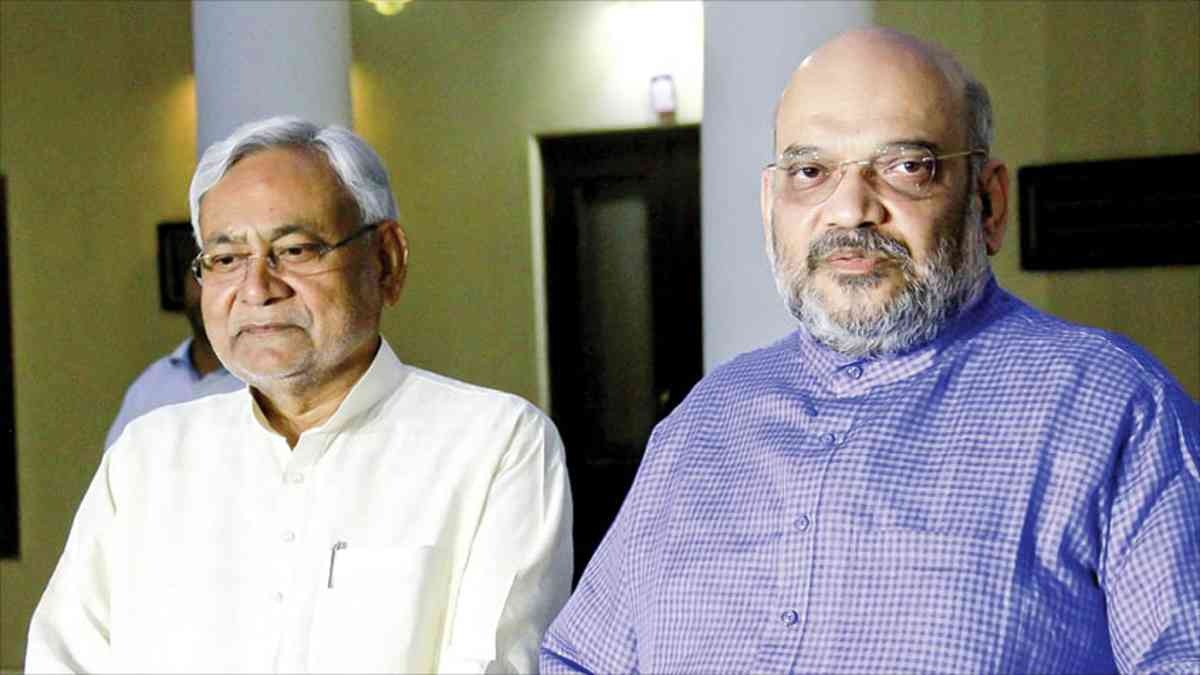
By Vikram Kilpady
Possibly the first state government to fall after the ascendance of the Modi-fied BJP without that party’s hand in the machinations has just shaken up the political landscape in Bihar, and the country. Nitish Kumar has pulled the rug from under the feet of the party. But since history has seen several turns first as a tragedy then as a farce, as noted by Hegel and Marx, Nitish Kumar possibly has the last laugh since he’s done the tragedy-farce duo twice. First, with the Rashtriya Janata Dal and, now, with the BJP, which among its many leaders has one man who gets called Chanakya way too often.
Once the party with a difference, the BJP has mastered the game of overturning elected governments; Madhya Pradesh where a maharajah switched to his aunt’s party, twice in Goa where elected Congress MLAs found faith in a new boss, Maharashtra where the cadre-strong Shiv Sena was ripped apart by a minister’s ambition, Karnataka where Operation Lotus blossomed first and spread its petals across the country.
Soon after the Modi magic of 2014, the dispirited opposition found new hope in the victory of Nitish Kumar and Lalu Yadav in the Bihar elections of 2015. But that was short-lived, Nitish found himself stifled by the ambition of Tejashwi Yadav and changed his mind, walking back to the BJP, which was eager to support him.
The 2020 election had the writing on the wall written in a more legible hand. The BJP won 74 seats, just one short of the party with the most seats, the RJD, which won 75. Nitish Kumar came third with 43 seats. The BJP was gaining at the cost of the Janata Dal United, which beat down Chirag Paswan’s rhetoric but couldn’t manage enough MLAs. The national party cannibalised its partner several times over throughout their association. The symbiosis of the initial years under Vajpayee was becoming a brain and brawn drain for the JDU. The election results were not free from controversy though, with the RJD alleging ballot boxes were changed in the middle of the night. The elections may have been won by the BJP and Nitish Kumar, helped by the image of Prime Minister Narendra Modi, but politics is not just platitudes, it also involves dirty work.
The use of RCP Singh by the BJP pointed at the potential of a Shiv Sena redux in the JDU, prompting the old fox to return to familiar Janata buddies, though once stabbed and all. But what is politics without the choosing of strange bedfellows, even if it borders on promiscuity and worse.
Read Also: Bihar BJP accuses Nitish Kumar of betraying Bihar people
The other angle to see the Bihar turn is from the lens of national politics. The idea of a country rid of the primary opposition party, aka becoming Congressmukt Bharat, has gained popular acceptance among the many for whom democracy is just voting in a new government. The turning of the Congress from its trademark white kurta to black attire was seen as a gimmick by the mainstream media. Far from a gimmick, the party was using what it encountered in Tamil Nadu where it rides on an ally’s stronger connect. The DMK’s parent, the Dravidar Kazhagam and its offshoots, still wears black shirts in protest against the idea of a homogenous India smearing over the vast differences between the country’s many constituents. With Hindutva becoming that all-unifying glue being applied by the BJP across the length and breadth of India, the Congress’s choice of black shows a new savvy.
Covid may have eclipsed the economy but many other slights and the worsening employment situation have India on uneven terrain. The Centre has to hold, but with accountability of successive state governments now enveloped buried in the image of the much-sought-after Strongman, an image that papered over the stark inadequacies of his administration, and won him and his party elections handsomely. The country was wearily dragging its battered economic self for another election some two years away. Nitish Kumar’s somersault has brought realpolitik back into the mix but investing all hope in serial side-switchers can be harmful for one’s emotions and well-being.
To be a rock for the Opposition, Nitish Kumar should not roll. But can old dogs learn new tricks?
Nitish Kumar stakes claim to form new Mahagathbandhan government in Bihar
Bihar Chief Minister Nitish Kumar resigns
India News
Yearender 2021: When hate uncovered its face
Instead of protecting victims of such incidents, the perpetrators not only enjoy immunity from the law, but also the administration in BJP-ruled states punishes victims. The use of false cases and arrests under draconian laws like UAPA are the preferred weapons.
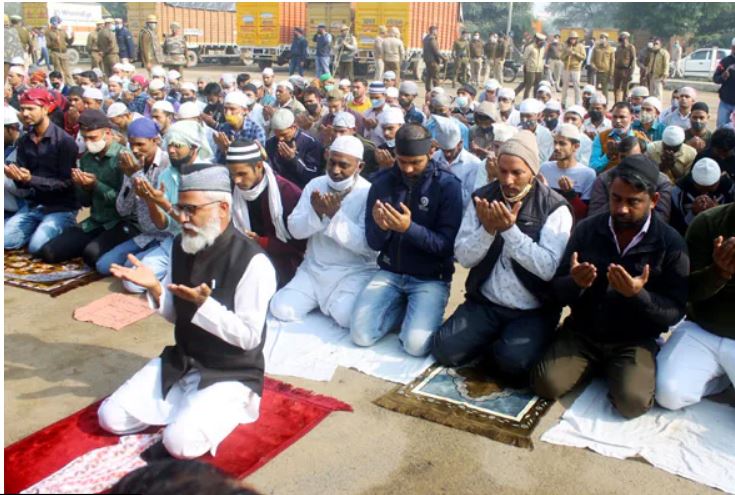
By Mohammad Javed Rasheedi
2021 is about to melt into 2022 in less than 48 hours. Majoritarian politics continued to hold its way over the country this year. But this year, it was not just Muslims but also Christians who felt the heat of Hindutva attacks across India as right-wing Hindu groups waged a culture war against them. Several churches have been attacked and statues of Jesus broken, the latest being in Ambala’s Army Cantonment, the scene of many a Rudyard Kipling work.
December saw targeted hate speeches against minorities. The one at Haridwar saw many participants vow to even take up weapons to redeem their faith by killing non-Hindus. The Hindu right-wing has waged war against Christians accusing them of religious conversion through their missionary work and Muslims for Love Jihad, an Islamophobic trope singling out Muslim men for falling in love with Hindu women and then converting them into Islam. However, such allegations targeting minorities have become a cornerstone of Hindu right-wing nationalism.
The Association for the Protection of Civil Rights, United Against Hate, and United Christian Forum jointly released a fact-finding report highlighting the series of attacks on churches and hate speech against Christians across India. According to the report, India has recorded more than 300 attacks on Christians and worship places within the first nine months of 2021.
Of the 305 incidents, 66 took place in Uttar Pradesh, 47 in Chhattisgarh and at least 32 in Karnataka.
While another report of the United Christian Forum had claimed that India reported more than 400 incidents of violence against Christians across the country. Among those, the incident involved storming churches, burning Christian literature, attacking schools and assaulting worshipers.
However, it is shocking that only 30 FIRs have been registered so far in these cases. On many occasions, restrictions were imposed on people to carry out religious ceremonies.
First on the list of attacks is the one on October 3, where a mob of 250-300 persons barged into a Roorkee church in Uttarakhand and attacked people, destroyed CCTV cameras, and vandalized church premises. Many reports said there were only 12 inside the church for prayers when the attack took place.
Apart from this, the attacks on churches were also reported from BJP-ruled states Haryana, Uttar Pradesh, Madhya Pradesh and Karnataka. And these attacks have taken place over allegations of religious conversion. Christians prayers meetings have also been stopped by the same Hindu mob who had stopped Jumma namaz in the so-called Millennium City, Gurugram. The city also saw an attack on a school’s Christmas celebration.
In the last week of 2021, the bank accounts of Mother Teresa’s Missionaries of Charity were frozen over FCRA claims, West Bengal Chief Minister Mamata Banerjee tweeted about the heartlessness behind the move affecting the charity of the outfit.
Some 22,000 patients and employees have been left without food and medicines, the West Bengal Chief Minister had tweeted.
The Missionaries of Charity was founded in 1950 by the late Mother Teresa, a Catholic nun from Macedonia, who moved to India and took care of the destitute and the poor and won the Nobel Peace Prize in 1979 for her work.
Hate speeches have been curtailed by some norms, keeping them among friends and family. The last week of 2021 saw more public hate speeches in the country. The controversial Dharam Sansad organized in Haridwar, other such events in Delhi and Chattisgarh saw where priests and leaders taking an oath to kill Muslims, and even urged Hindus to arm themselves against the Muslims to make India a Hindu Rashtra.
With next year’s assembly elections in Uttar Pradesh, Uttarakhand, Punjab, Goa and Manipur due shortly, the increase in such hate is an attempt at reviving polarisation.
The violence in Tripura, where VHP hoodlums attacked Muslims and vandalized some of their mosques and Friday prayers disruptions at designated places at Gurugram were also the prime example of rising hate against Muslims.
Anti-Hindu violence in parts of Bangladesh triggered violence in Tripura. The communal riots erupted on October 26 after a rally organized by the Vishwa Hindu Parishad to protest against the attacks on Hindus in Bangladesh turned violent.
The VHP and the Hindu Jagran Manch organized rallies in different parts of the state to protest against the violence in Bangladesh. Later, the VHP and other right-wing groups denied any role in the violence.
The anti-Hindu violence in Bangladesh, which erupted during the Durga Puja festival, was triggered by rumours that the Quran had been insulted in one of the pavilions set up for the celebrations. Seven people were killed, several temples desecrated, and hundreds of houses and business establishments of the Hindu minority were torched.
However, many Muslim groups alleged political conspiracy claiming that the minorities were being targeted in the north eastern state. There were many arrests and some journalists covering the riots in Tripura were also detained. Those who tweeted in favour of Tripura’s Muslims also found themselves being served notices by the state police.
The Uttar Pradesh government had faced severe criticism from the opposition over the killings of Kasganj youth Altaaf in mysterious circumstance. He had been arrested on suspicion of eloping with a Hindu woman. Again, the smoldering love jihad theory. The law and order in Uttar Pradesh, which had earlier won so much praise from PM Modi and other BJP leaders, has been roundly criticized by opposition parties in Uttar Pradesh.
The family of the deceased had alleged that he was tortured by police in the lockup, which led to his death. Police claimed the accused killed himself using the drawstring of his jacket’s hood when he went to the lockup washroom.
Apart from mob lynching, Muslim street vendors in Ahmedabad and some parts of Madhya Pradesh and other parts of the country have been threatened and disallowed from pursuing their livelihood. In Ahmedabad, the Hujarat High Court stepped in to tell off the civic authority to desist from such measures. In Assam, poor peasant families cultivating land for decades were brutally evicted only because they belonged to the Muslim minority. The point-blank shooting of Moinal Haque by police personnel caught on video and the subsequent death dance by a photographer with the remains indeed were a mirror for the crumbling facade of secular India, now overtaken by an aggressive mindless herd mentality spewing hate and violence.
Read Also: Masik Shivratri 2022: Know date, shubh muhurat, puja vidhi, significance
An empty desolate car park outside Sector 37 police station in Gurugram where Muslims had performed Friday prayers for more than a decade turned into a battleground of faith. Hindu right-wing groups staged protests, sloganeered during Friday prayers and held a Govardhan puja at the namaz site just to deny namaz here.
Instead of protecting victims of such incidents, the perpetrators not only enjoy immunity from the law, but also the administration in BJP-ruled states punishes victims. The use of false cases and arrests under draconian laws like UAPA are the preferred weapons.
Haryana news
Dushyant Chautala stood up for farmer’s cause; opposition failed
The Indian farmer constitutes 40 per cent of the country and an even higher percentage of its poor and as the available data points out, is under immense stress.
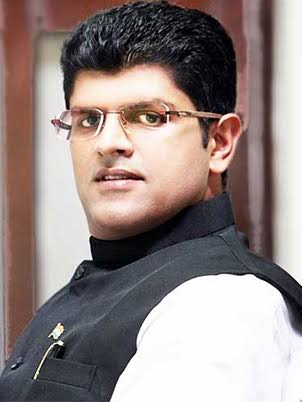
By Prateek Som
The Indian farmer constitutes 40 per cent of the country and an even higher percentage of its poor and as the available data points out, is under immense stress. The modernization of the central farm laws is nothing but an adaptation of provisions which already exist in many states, including Punjab and Haryana. How come the three acts become anti-farmer in some states and why not in many others is something the activists themselves cannot explain.
Big states like Uttar Pradesh, Bihar, Maharashtra, West Bengal, Rajasthan are not even a part of the farmers’ agitation and there is no protest against the central or state government in these states, despite the fact that BJP is not in power in some of these states. More importantly, some agriculturists and several economists have been campaigning for abolishing MSP based procurement as it is unfairly tilted towards a few states like Punjab.
The Central government has neither abolished the MSP nor does it say anything against it in the laws. If, despite this, the impression is being spread that MSP is to be abolished, this is clearly mischievous. The activists are not only spreading the misinformation about the MSP abolition but they are asking for an unreasonable clause in the law for unlimited MSP based procurement which was never a part of the previous laws related to agriculture and APMC acts.
The Indian farm bills are in line with international precedence wherein a number of developing economies have been making changes to their agriculture policies since the 1990s to encourage private sector involvement which would provide a major fillip to the sector. The International Monetary Fund has also backed the recent farm acts as being an important step in the right direction. Despite all the supportive arguments in the favour of the laws, India has seen unprecedented protest in and around the capital as a result of political vendetta.
Politics of Yogendra Yadav and Gurnam Chaduni and its irrelevance to the farmer’s cause
Raising the farmer’s issues should be an act done collectively but the state farmer activists are trying to establish a monopoly in the leadership. They are not even active in all the parts of the state, but targeting only those districts with paddy belt of cropping pattern. Most of them are politically motivated.
In an interview given to NDTV, Yogendra Yadav came out as an aspiring candidate for Haryana CM post and he was advertised as the most fit politician for the position. He formulated his own party, ‘Swaraj’, after being expelled from AAP and lost badly in polls. It is a proof that he lacks mass support. A report by Divya Bhaskar states that farmer leader Gurnam Chaduni was accused of teaming up with political parties like Congress, AAP, SAD and some independent leaders and getting into a deal worth Rs 10 crore to topple the Khattar government in Haryana in return of Congress ticket for elections. There are allegations that Chaduni is collecting funds out of the collection drive for protests and hiding the funds from other leaders. He was also blamed for instigating farmers to disrupt the January 26 celebrations at the Red Fort. Haryana CM Khattar held Chaduni responsible for instigating the farmers that led to clashes between farmers and police at Karnal just before the Kisan Mahapanchayat programme. As a result of his politically motivated efforts, Chaduni was suspended by Samyukt Kisan Morcha from meeting politicians across country. In the 2019 assembly elections, Chaduni contested from Ladwa as an Independent candidate, but suffered a heavy defeat, garnering only 1,307 votes and losing his deposit.
Yogendra Yadav and Gurnam Chaduni are mere examples of how election failures like themselves are trying to garner the support of the commoners for their own political resurrection. The claim of being a leader of the farmers is in contravention with the inconsiderable support both Yadav and Chaduni got in the polls. The Shiromani Akali Dal that left the NDA government in the pursuance of state elections and under the disguise of farmer’s demands has made zero impact on the political ground of Punjab. Their biases can not only be seen from their actions but their cause and concern for two states out of 28. The threat posed by leaders like these to the democratic process of passing of a bill can be seen through the factual analysis of what the laws actually say versus the intentional misconceptions spread by such leaders.
Since an unlimited MSP based procurement is not in the law even today, it is not clear how this is even an issue. More importantly, putting this in the law means India will get tied to distortions that MSP based prices cause in perpetuity. The government has made it clear that procurement at MSP will continue and also that the mandis will not stop functioning. Farmers will have the option to sell their produce at other places in addition to the mandis. It is worth noting that only 6% of farmers actually sell their crops at MSP rates, according to the 2015 Shanta Kumar Committee’s report using National Sample Survey data. There are fears that contract farming will lead to land loss of the small and marginal farmers to big corporates. However, adequate protection of land ownership is in place to protect farmer interests. The act explicitly prohibits any sponsor firm from acquiring the land of farmers – whether through purchase, lease or mortgage. The point to note is that contract cultivation is voluntary in nature and farmers cannot be forced into an agreement.
How Dushyant Chautala is taking initiatives for farmers
Dushyant Chautala is the only state leader who has met Central leaders regarding the farmer demands – Prime Minister, Home Minister, Agriculture Minister along with other cabinet ministers Nitin Gadkari and Piyush Goyal. No other leader in India has met them specifically for farmers’ demands. That shows the concern and responsibility on the part of the JJP leader who is a leader of the masses.
In April 2020, Deputy CM Chautala addressed that the state government will procure the crops of the farmers in a better way while saving the state from the corona epidemic. As a result of this, even in the pandemic situation, mandis have been increased to 162 from 67 for the purchase of mustard at MSP. Haryana is the only state across the country which has started procurement of mustard crop in this pandemic. In November 2020, Dushyant assured the farmers that government will buy every grain of the crop. He made procurements for non-MSP crops to get the rate of MSP crops. He also announced formation of women Self-Help Groups in all villages on the lines of successful initiative in Hisar, to increase employment opportunities for women and showcase their talent at international level.
In February 2021, Dushyant made the announcement to buy 6 crops including wheat, mustard, pulses, sunflower, gram at MSP, barley is included for the first time. Haryana is the first state to offer MSP for barley. Every farmer is to be registered on the ‘Meri Fasal Mera Byora’ portal at MSP and payment amount will arrive in the farmer’s account within 48 hours. Along with recent announcements, the schemes like Mukhyamantri Parivar Samman Nidhi Scheme, Haryana Agricultural Machinary Grant Scheme, Pragatishil Kisan Samman Yojana, Pragatishil Kisan Trainer and Kisan Mitra Scheme to promote the inclusive growth of farmers in Haryana.
The main agenda of ongoing agitations
Amidst all the chaos, the agitations by activists like Yogendra Yadav and Gurnam Chaduni are for targeting Deputy CM Dushyant Chautala. It is a matter of record that many times they carried protests outside his residence and their intention and cause are suspicious to the core as they did not target any other leader in power like this.
The agitations in Haryana are mainly against the JJP and specifically targeted towards the leadership of Deputy CM Dushyant Chautala. The attempts of the farmer leaders to make Dushyant Chautala resign from the government are nothing but petty politics to destabilize the state government. If the threat to farmers is real, why the cause of the farmers is not taken up by the farmers from masses than some farmers from selected areas and that too under the leadership of politically motivated specific leaders only who have ties with the parties who are eyeing the upcoming elections?
The high-pitched farmer agitation is not just based on incorrect perceptions of what the new farm laws will result in – the abolition of APMC mandis and MSP-based procurement – they are also not about protecting the farmer in the long run. The agitation is purely an attempt to corner the stable functioning state government, to boost the sagging political fortunes of the activist leaders by deliberately misleading farmers, to run a personal vendetta against a young and dynamic leadership of Dushyant Chautala who is making efforts for the farmers and to give chance to Congress to come in power. That is why, before the activists decided to fuel the agitation, they focused on batting for spreading misinformation, have nothing to say about non-MSP crops/livestock in the state and have no future agenda for the inclusive growth and development of farmers. And to make the matters worse, they are trying to provoke the masses against the people in power for their vested political interests.
The author is an Advocate in Supreme Court of India and National Spokesperson of Jannayak Janta Party
-
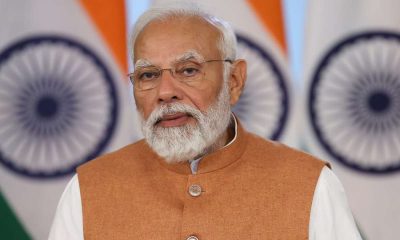
 2024 Lok Sabha Elections18 hours ago
2024 Lok Sabha Elections18 hours agoPM Modi calls for high voter turnout in second phase of Lok Sabha elections 2024, says your vote is your voice
-
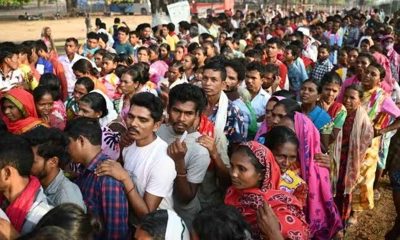
 2024 Lok Sabha Elections12 hours ago
2024 Lok Sabha Elections12 hours agoLok Sabha election 2024: Nearly 50% voter turnout recorded in second phase till 3 pm
-

 India News17 hours ago
India News17 hours agoSalman Khan house firing case: NIA interrogates arrested shooters Sagar Pal, Vicky Gupta for three hours
-

 2024 Lok Sabha Elections11 hours ago
2024 Lok Sabha Elections11 hours agoElection Commission books BJP MP Tejasvi Surya for seeking votes in the name of religion
-
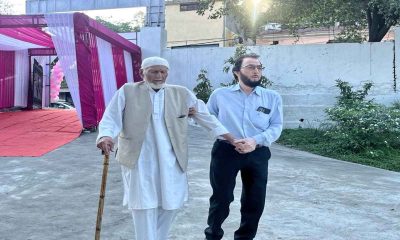
 2024 Lok Sabha Elections16 hours ago
2024 Lok Sabha Elections16 hours agoLok Sabha elections 2024: 102-year-old man walks to polling booth to cast his vote in Jammu

